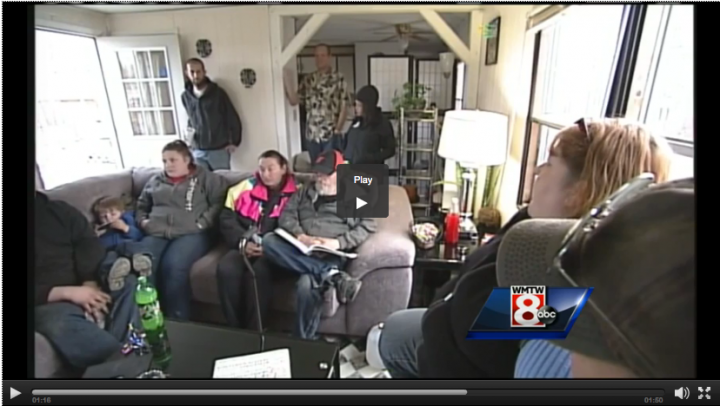The landlord of the Meadowbrook Trailer Park has left residents with sewage coming out of bathroom faucets. Floors are broken and aren’t being fixed. These are just a few of the abuses on a list of neglect that is far too long for the residents of this mobile home park nestled in Richmond, Maine. Now, this Sunday, the tenants will vote on whether to try to take ownership of the community and to run it democratically. The possibility has caught the attention of local media: the local Portland, ME ABC affiliate covered the story on Wednesday.

While the conditions faced by these residents are deplorable, their situation can, unfortunately, often be found in many mobile home parks.
The New York Times recently reported on investors looking to profit from people who live in mobile home parks by buying run-down, neglected parks, fixing them up–and ratcheting up the rent while squeezing out delinquent residents in a hurry.
There is another option, though. The residents of Meadowbrook can take control of the situation and work together to address the issues that they face. If they can become a democratic, resident-owned community (ROC), and take over ownership of the park, it would allow residents to fix the problems their way. As Meadowbrook Tenant Association president John Wilson, Jr., says, “We’ll finally be able to do all the things we’ve been wanting to do forever, and tenants will have an equal voice.” Should the Meadowbrook residents decide to go co-op and succeed in buying the park, they will be joining the growing resident-owned communities movement. (Watch the reflections of community members who appreciate the control they now have over their living situation here and here.) As CDI cooperative developer Maureen Carroll recently told South Coast Today, “The real reason people want to form these co-ops and run their own parks is that it lets people own their futures. The land is theirs to run how they see fit.”
Should the Meadowbrook mobile home park residents choose to explore the co-op option in their Sunday vote, they won’t be alone. The Cooperative Development Institute’s Andy Danforth has been working alongside the tenants to make sure they know their options and have all the available resources they need to make this kind of decision. This is, of course, not the first time CDI has worked alongside a mobile home park facing a dire situation. In 2011, CDI assisted the tenants of the Bunker Hill Mobile Home Park in a resident buy-out of their land and conversion to a co-op. Their then-landlords were intending to close the park. But by coming together, converting to a co-op, and collectively buying the land, Bunker Hill residents were able to secure their future and avoid displacement. Since then they have worked diligently to improve their community. Just last month, the now Bunker Hill Community Cooperative took part in a disaster-preparedness exercise. Out of this exercise, the Bunker Hill Cooperative is soon to complete a disaster-preparedness plan – the first of its kind in the state of Vermont for small communities. This is a world of difference from when they were facing eviction.
This is why resident-owned communities are so vital. It allows residents who would normally have little control and no recourse over the dire conditions forced onto them build a path forward for a better future.
Let us wish the residents of Meadowbrook the best of luck for their vote on Sunday and the road ahead.
